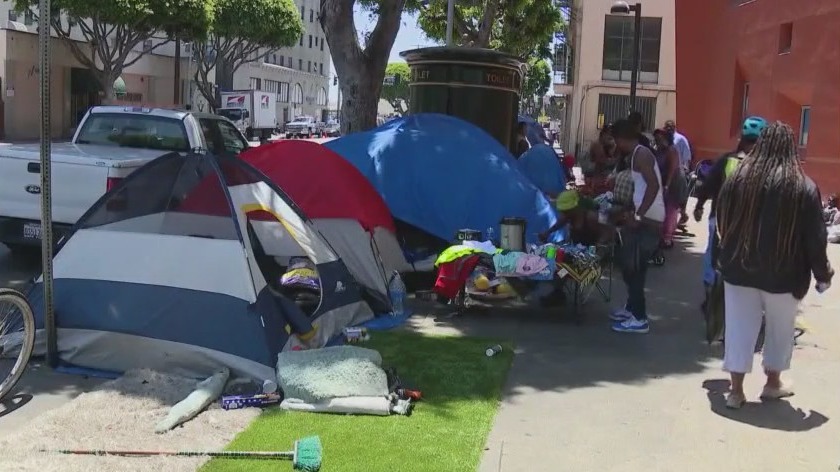Karen Bass launches program to prevent encampments from returning to streets of LA

LA Co. Supervisor Hilda Solis discusses Mayor Bass' 'Inside Safe' homelessness initiative
Los Angeles Mayor Karen Bass has launched a new initiative aimed at combatting the city's homeless crisis. County Supervisor Hilda Solis breaks down the plan.
LOS ANGELES - In what her office described as a "fundamental change" to Los Angeles' approach to addressing encampments on city streets, Mayor Karen Bass signed an executive directive Wednesday launching a program that seeks to proactively bring unhoused residents indoors and prevent encampments from returning.
The program, called the Inside Safe Initiative, will work to identify the "highest need encampments" that have a chronic and high demand for services, according to the directive. Using citywide coordination between various departments and agencies, the action plan calls for identifying interim housing and eventually permanent housing resources for each person living in the encampments.
"People should not be left to live and die on the streets because the city isn't giving them someplace to go," Bass said at a news briefing Wednesday at the People Concern, a social services agency in downtown Los Angeles. "Today, we are giving people safe places to move inside with ongoing support so they can stay inside and stay for good."

LA Mayor Karen Bass launches 'Inside Safe' program
Bass plans to launch the "Inside Safe" program Tuesday, which will use master leasing with motels near encampments to place unhoused people.
The plan includes working with social services providers to identify how many people are living in encampments. The executive directive, Bass' second since taking office 10 days ago, comes after she declared a state of emergency over homelessness as her first official act. Last week, Bass signed an executive directive that streamlines the approval process for fully affordable housing projects.
RELATED: LA Mayor Bass: Homeless encampments should be 'significantly down' in 4 years
Wednesday's directive calls for a report back to the mayor's office with an action plan by the end of March.
There are an estimated 41,980 unhoused people in the city of Los Angeles, up 1.7% from 2020, according to the latest count by the Los Angeles Homeless Services Authority.
The city has worked to identify motels that could provide temporary housing to those living in encampments, according to officials. Also under consideration are master leasing buildings and utilizing shared housing.
"For too long we just said, `It's one option. It's one way. It's permanent supportive housing only -- we know that can be expensive," said Va Lecia Adams Kellum, president and CEO of St. Joseph Center, who helped develop Inside Safe. "We know, given the crisis and emergency, we need to move much more swiftly than that."
On Tuesday, the Los Angeles County Board of Supervisors unanimously voted to support Bass' emergency declaration, calling for representatives of various county departments to attend city leadership meetings regarding the Inside Safe program.
RELATED: LA Mayor Bass signs affordable housing executive order
Kellum hailed the cooperation between the city and county as a step toward the program's success. Previously, she said officials have felt frustrated over needing to contact different departments and agencies to get to certain resources.
"You're going to see this open up in a way that you've never seen before," Kellum said. "I think you're going to see a throughput that's unprecedented."
Mercedes Marquez, the mayor's chief of housing and homelessness solutions, said the initiative "immediately moves us to collaboration and coordination" across government agencies, social services providers, individuals with lived experiences, community organizations and the private sector.

Karen Bass discusses plans to house LA's homeless
Los Angeles Mayor Karen Bass said she hopes most if not all homeless encampments will be gone in four years.
The action plan is also expected to include information on funding, and potentially using funds from Measure ULA, which passed in November as a tax that would go toward combating homelessness.
Bass denied that the program would center on clearing encampments, but said that "will happen in the context of it."
"The role of the police is if they are needed," Bass said. "To be clear, this is a housing-based strategy. This is not a punitive strategy."
The mayor added that the city will not use Section 41.18 of the municipal code, the city's anti-camping law, for the plan. The ordinance was expanded earlier this year to ban encampments near schools and day-care centers. Some council members have been more aggressive than others in enforcing the policy in their districts.
Bass said she would be focused on housing and providing services, "not on law enforcement."
"There might be a council person that wants to use it in their area, but the approach we are using is not 41.18," Bass said.
The emergency declaration -- which is scheduled to last six months -- allows Bass to take more aggressive executive actions to confront the homelessness crisis, though the City Council will have to sign off on it every 30 days.
The last time a mayor declared a local emergency related to homelessness was in 1987, when Mayor Tom Bradley cited the effect of winter weather on people experiencing homelessness, according to the declaration. The conditions now, the declaration claimed, are "even more dire."

